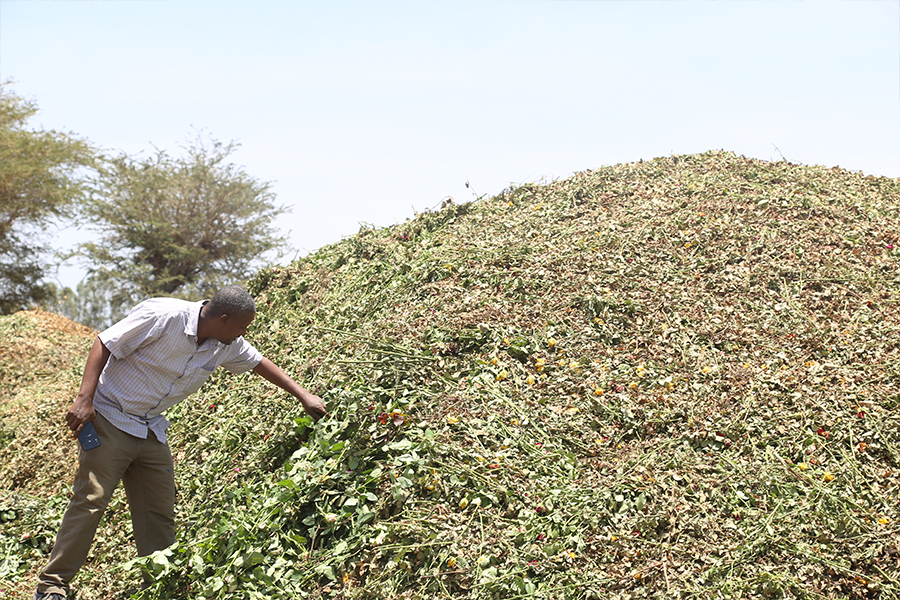
A decades-old state monopoly on seed marketing will soon be over if a bill in the making by experts at the Ministry of Agriculture sees through the legislative process.
Officials of the Ministry hope to repeal an eight-year-old proclamation that governs the distribution and marketing of seeds, opening the trade to the private sector. The Ministry had attempted to make similar changes a few years ago, with the previous bill making it to Parliament in 2017. However, it remained unratified until Parliament returned the bill to the Ministry demanding a few changes following the formation of the new government earlier this year.
Members of Parliament wanted to see changes in the supply of emergency seeds, granting the government the right to declare a seed shortage. In emergencies, the bill in the making gives the power to direct the supply and distribution of seeds to areas it deems most needed. The bill also envisions establishing a federal agency with the regulatory authority on seed marketing.
Experts are drafting the regulation for the Authority's establishment, slated to be tabled to the Council of Ministers, disclosed Fiseha Teshome, director of seed standard regulation at the Ministry.
The main provisions of the bill sent to lawmakers three years ago, such as the liberalisation of the seed market, have remained mostly untouched in the latest version.
Ethiopia’s seed market is dominated by government institutions, which control seed management from breeding and multiplication to distribution and marketing. There is hardly any room for the private sector, and the market suffers from supply constraints. Demand for improved seeds was estimated at 2.1 million quintals last year, over four times higher than the supply. Supply has doubled over the previous five years.
There are 18 million rural households in Ethiopia farming 22.8 million hectares of land, with an average holding size of 0.84ht.
However, some experts contend that federal agencies' control of the seed market has not been without merit. The state-dominated seed supply chain has been inefficient, according to Assefa Senbeta, a plant scientist who worked at the Ethiopian Seed Enterprise (ESE) for over 20 years.
"The accurate demand is unknown," he said.
Assefa believes the bill is a step in the right direction, however. He says that direct seed marketing would reduce the price of seeds for the consumer and could enhance agricultural productivity.
Farm productivity has been growing at a slow rate. During the last mehir season, 341.8 million quintals of crops were harvested, exhibiting a 68pc increase compared to a decade ago.
In 2004, eight private companies were involved in the multiplication and distribution of improved seeds. The introduction of the first proclamation governing the seed market in 2013 did not have much of an effect on private sector involvement. The number of firms has doubled since then, but the state still accounts for 80pc of the market.
Pioneer Hi-Bred Seeds, a private company engaged in the domestic production of hybrid seeds, is an industry veteran. It first entered the market three decades ago but has remained dependent on government channels to market its products to farmers. Pioneer imports hybrid seeds mainly from South Africa and multiplies them domestically.
“We've been distributing hybrid seeds through government agencies at the federal and regional levels,” said Yilma Amenu, senior agronomist at the company.
The Agriculture Ministry and the former Agricultural Transformation Agency (ATA) launched a project to directly market seeds beginning in 2011. The project was piloted in two weredas of the Amhara Regional State; eight years later, it had expanded to cover 290 weredas in four regions. Private companies could market seeds to farmers through cooperatives and their outlets.
Pioneer was one of the private companies that have been involved in the project in 2016. Last year, it multiplied 150,000 quintals of hybrid seeds and supplied unions in three regional states.
Edget, a union comprising 19 cooperatives and nearly 1,200 farmers, is among those that bought seeds in this scheme. Located in Butajira in the Gurage Zone of the Southern Regional State, the Union joined the marketing project three years ago. It distributed the improved seeds acquired from private firms to the cooperatives under its wing.
“Before the introduction of direct seed marketing in the region, there were many bottlenecks that hindered the smooth flow of improved seeds,” said Biniam Birhanu, manager of Edget. “Supply has improved by at least half after the Union joined the project.”
However, companies like Pioneer face many challenges despite the perceived success.
“There are still problems with hybrid seed adoption and trial,” Yilma told Fortune. “We import improved seed varieties that have passed through trials in another country. We're, however, forced to duplicate the same process here.”
The bill proposes to allow the Agricultural Authority to acknowledge certification from agencies overseas after verifying the results of its tests conform with the Ethiopian seed quality testing. It would also enable the Authority to register any variety listed in a catalogue of international agreements the country is a signatory to. It also authorises companies that fulfil specific criteria to certify and sell their produced and processed seeds. Companies must acquire a certificate of competence and conduct demand identification, product promotion and customer satisfaction assessments.
If the bill is ratified, it will help attract investment and expand direct seed marketing beyond the weredas covered by the project, according to Fiseha.
“The amendment will allow for the full participation of the private sector,” he said. “The bill will set the stage for a wholesome overhaul of the very traditional and state-dominated seed market.”
PUBLISHED ON
Dec 11,2021 [ VOL
22 , NO
1128]

Year In Review | Sep 10,2021

Fortune News | Apr 03,2021

Covid-19 | Apr 11,2020

Agenda | Mar 28,2020

Exclusive Interviews | Feb 12,2022

Fortune News | May 28,2022

Fortune News | Jul 18,2021

Radar | Oct 09,2021

Radar | May 23,2021

Radar | Jul 11,2021

Dec 22 , 2024 . By TIZITA SHEWAFERAW
Charged with transforming colossal state-owned enterprises into modern and competitiv...

Aug 18 , 2024 . By AKSAH ITALO
Although predictable Yonas Zerihun's job in the ride-hailing service is not immune to...

Jul 28 , 2024 . By TIZITA SHEWAFERAW
Unhabitual, perhaps too many, Samuel Gebreyohannes, 38, used to occasionally enjoy a couple of beers at breakfast. However, he recently swit...

Jul 13 , 2024 . By AKSAH ITALO
Investors who rely on tractors, trucks, and field vehicles for commuting, transporting commodities, and f...

Jun 28 , 2025
Meseret Damtie, the assertive auditor general, has never been shy about naming names...

Jun 21 , 2025
A well-worn adage says, “Budget is not destiny, but it is direction.” Examining t...

Jun 14 , 2025
Yet again, the Horn of Africa is bracing for trouble. A region already frayed by wars...

Jun 7 , 2025
Few promises shine brighter in Addis Abeba than the pledge of a roof for every family...